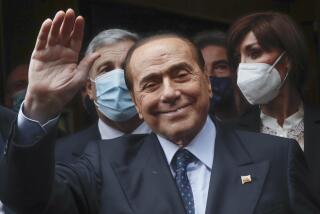EUROPE : Leadership Void Leaves Italy Rudderless on Sea of Reform
ROME â In the fourth year since Italy embarked on an overdue overhaul of its corrupt and antiquated political system, here is an interim score: System 1, Italy 0.
Once again, front pages, television screens and corridors of power are dominated by politicians of every stripe gripped in a crisis of their own making.
Yes, there is no government. Italy yaws. President Oscar Luigi Scalfaro is meeting with 26 different parliamentary parties and groups before deciding who to name as successor to technocrat Prime Minister Lamberto Dini.
If Scalfaro finds consensus to press for painful institutional reforms, Dini may be recalled to head Italyâs 56th postwar government. Otherwise, there will be a solve-nothing election.
Italyâs need for political reform is as starkly apparent today as it was in 1992, when a national corruption scandal triggered popular revolt against old pols and parties who had ruled since World War II.
A grandly named Second Republic, headed by superstar political rookie Silvio Berlusconi, lasted just seven months, collapsing in internal discord in December 1994.
Berlusconi, a billionaire media baron, has tarnished hopes of returning to power: He went on trial in Milan this week, accused of bribery. Counterattacking, Berlusconi says he is victim of a political vendetta, that the $240,000 bribe was paid without his knowledge by his Fininvest companies as extortion demanded by tax police in exchange for lenient audits.
Over the past year, his successor, Dini, and a Cabinet of quiet professionals have sought to make more rational the costs of government while promoting political and institutional modernization. Dini failed to complete reforms before being brought down last week in an old-fashioned show of strength by the parliamentary right.
âVoting patterns and parties have changed, but reform of institutions was never implemented. Therefore, we must strengthen the government and streamline the parliament before we can hope to create an executive who will last a full elected term,â said political scientist Gianfranco Pasquino, a senator representing the former Italian Communist Party, now officially social democratic.
Key to any new system would be the election of a chief executive with real authority. Italy now is ruled by a figurehead president and a prime minister who is habitually hostage to weak coalitions of fractious parties. Neither is chosen directly by voters.
All parties agree that change is urgent, but there are potentially concept-killing differences on what form it should take. The center-right favors direct election of a strong president; the left prefers direct election of a parliament through reforms that would effectively reduce the number of parties and make it harder to topple a government without a constructive alternative.
The parliament itself is a major target, with calls to restructure two chambers that duplicate each otherâs work. Reformers also want a new election law. Most parties favor majority voting. Some want the U.S.-British winner-take-all method but most prefer some version of the French runoff between the two top finishers.
Reformers are also pressing for controls against political abuse of the Italian media and a clearer separation of powers between parliament and the judiciary. In the post-Cold War, notes James Walston, a political scientist at the American University of Rome, such reforms are conceivable because once-bitter polarization has largely lapsed.
âBeneath the rhetoric, you often canât tell the policy differences between left and right,â said Walston.
The quest for change is challenged by those who fear losing political advantage. What drives it, by contrast, is national recognition that the political system must match world-class economic performance if Italy is to be a credible partner in 21st century Europe.
More to Read
Sign up for Essential California
The most important California stories and recommendations in your inbox every morning.
You may occasionally receive promotional content from the Los Angeles Times.










